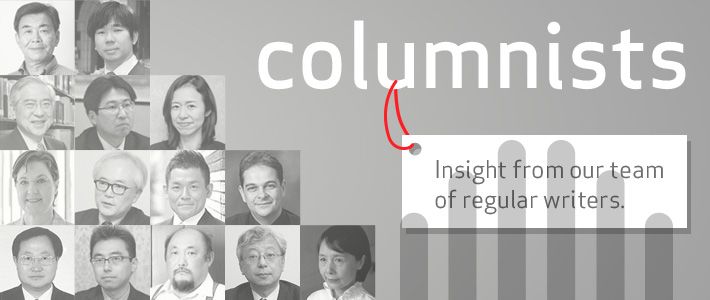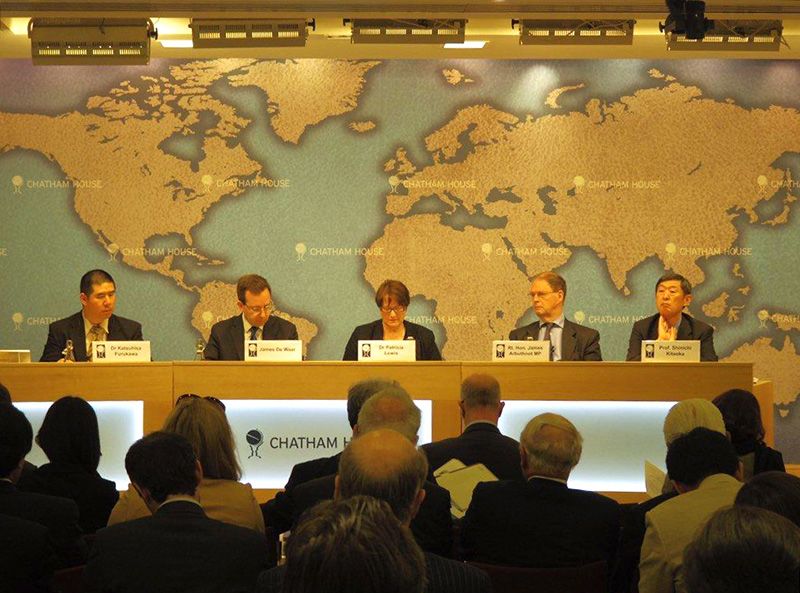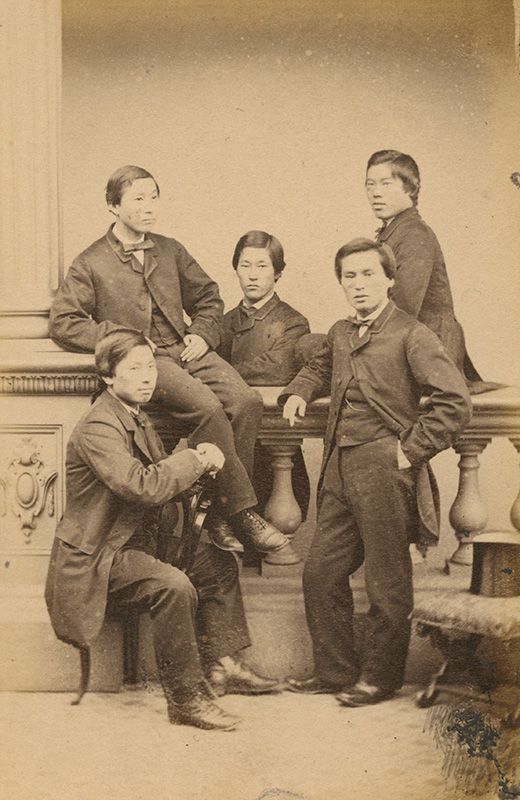
Learning From the Chōshū Five: A Conference in London Discusses the Past and Future of Japan’s Relations with Great Britain
Politics- English
- 日本語
- 简体字
- 繁體字
- Français
- Español
- العربية
- Русский
The year 2013 marks a milestone for relations between Japan and the United Kingdom. As well as being the 400th anniversary of the first official diplomatic exchanges between the two countries, this year is also the 150th anniversary of the Chōshū Five, a celebrated group of samurai intellectuals who traveled to Britain to study and ended up playing a vital role in Japan’s modernization. Today too few people in both countries are aware of this history.
The first exchanges between Britain and Japan date back to the arrival of the East India Company’s ship Clove at Nagasaki and Hirado in June, 1613. Two hundred and fifty years later, in November 1863, five members of the samurai elite from the Chōshū domain (today’s Yamaguchi Prefecture), traveled to Britain to study. This was toward the end of the Edo period (1603-1868), when Japan was still officially closed to the rest of the world. Two of the five, Itō Hirobumi and Inoue Kaoru, became important statesmen and played a central role in Japan’s modernization after their return from London.
Successful Japan-UK Global Seminar
The UK-Japan Global Seminar was held at the Royal Institute of International Affairs (Chatham House) in London on June 20 and 21, 2013. The seminar was jointly sponsored by the Royal Institute and the Nippon Foundation, with the cooperation of the Great Britain Sasakawa Foundation. I was among those in attendance.
 The UK-Japan Global Seminar: Fostering Strategic Partnerships was held at Chatham House.
The UK-Japan Global Seminar: Fostering Strategic Partnerships was held at Chatham House.
Panelists from Japan included Kitaoka Shin’ichi, president of the International University of Japan; Itō Motoshige, professor at the University of Tokyo; Fujiwara Kiichi, professor at the University of Tokyo; and Hosoya Yuichi, professor at Keiō University. From the UK, the panelists included politicians, academics, researchers at Chatham House, and journalists. As a seminar for intellectual exchange between Japan and the UK, this was the first substantial gathering to be held for some time.
Over the next five years, annual seminars will be held alternately in Tokyo and London. This was the first of the series, and with vigorous discussions covering a wide range of topics, the seminar was highly successful. Nonetheless, it was hard to avoid wondering why Japan-UK exchanges had been so watered-down or even neglected in the past.
The seminar served as a reminder of how important the Japan-UK relationship is to both countries. We need to reaffirm the importance of history within the international community, and learn from the United Kingdom’s long experience and its network-building expertise.
At the Vanguard of Japan’s Modernization
 (From the collection of the Hagi Museum)
(From the collection of the Hagi Museum)
The men who became known as the Chōshū Five were Itō Shunsuke (later Itō Hirobumi), Inoue Monta (later Inoue Kaoru), Endō Kinsuke, Yamao Yōzō, and Nomura Yakichi (later Inoue Masaru). All five were young samurai who grew up in the Chōshū feudal domain. Itō went on to become Japan’s first prime minister. Inoue became the first minister of foreign affairs, while Yamao became a minister for public works and is known as the father of Japanese industry. Endō served as head of the National Mint, and Nomura is regarded as the father of the country’s railways.
The five men were in England for five months from November 1863, mainly studying at University College London. A monument commemorating their stay now stands in the campus grounds.
In 1865, 19 students from the Satsuma clan (now Kagoshima Prefecture) followed in the footsteps of the Chōshū Five by traveling to the UK to study. These included Godai Tomoatsu, later a prominent businessman and politician, and Mori Arinori, who became the first minister of education.
Of particular importance to Japan’s nineteenth-century modernization was the Iwakura Mission to North America and Europe from 1871 to 1873. Headed by Iwakura Tomomi in the role of extraordinary and plenipotentiary ambassador, the mission comprised around 100 people—including the statesman Ōkubo Toshimichi and Itō Hirobumi.
What did Ōkubo, Itō, and the others see in the Western countries they visited? After their return to Japan, the emphasis was on domestic affairs rather than foreign policy. Unfortunately, their greatest influence was not Britain but Prussia, then under the leadership of Bismarck. It hardly needs saying that their understanding of the West became the foundation for Japan’s modernization. In this sense, the Chōshū Five, who risked danger to visit Britain in the closing days of the Tokugawa shogunate, were in the vanguard of the construction of modern Japan.
The Forgotten Anglo-Japanese Alliance
Another historical fact discussed at the seminar was the Anglo-Japanese Alliance, signed in 1902. One panelist noted that this was the first treaty of alliance to be concluded between Western and non-Western countries since the modern nation state system came into being following the Treaty of Westphalia in 1648. Nowadays, however, there appears to be little appetite for re-evaluating the historical significance of the Anglo-Japanese Alliance.
In his book Kokusai chitsujo (The International Order), Professor Hosoya, one of the participants at the seminar, writes that one of the major challenges for the international community during the twentieth century was the question of “how to achieve shared values and a system of harmony and cooperation that would incorporate non-Western countries like Japan and China.” The Anglo-Japanese Alliance was critical in this respect. Despite this early attempt to create shared values, however, the Anglo-Japanese Alliance came to an end in 1923 amid rising international tensions.
Several panelists from both countries asked why Japan and the UK seem unable to cooperate over policy toward China. Many expressed concerns about China’s apparent disregard for international law in cyberspace. It was agreed that Japan and the UK ought to do more together to protect their interests in cyberspace.
In historical context, Britain proposed an alliance with Japan when czarist Russia was expanding into the Far East and had constructed the Manchuria Railway and acquired territorial rights over Port Arthur and Dalian. Japan entered the alliance in an attempt to protect its own interests against Russian expansion into China. Japan and Britain therefore share a long history in respect to China. Many people at the seminar suggested that greater use could be made of this experience.
Japan’s Five PR Strengths
Another concern raised by many participants from both countries was Japan’s declining influence within the international community. Replies to questions on this subject centered on the need to revitalize the Japanese economy and reactivate its diplomacy. One Japanese participant gave a particularly interesting reply, suggesting five aspects of Japan’s diversity that the country should use to boost its international profile.
These were:
One: The atomic bombings of Hiroshima and Nagasaki, and Japan’s declaration that it will never develop or possess nuclear weapons.
Two: Japan was the only industrialized country to emerge victorious from World War I and be defeated in World War II. This unique experience means that Japan has the historical experience to act as an intermediary between the victors and the defeated.
Three: Like Germany, Japan underwent rapid economic growth after World War II, and established itself as a modern democracy with very little terrorism or strife.
Four: Japan’s uniqueness from a religious point of view. Japan is religiously diverse, with the indigenous Shinto existing alongside Buddhism, Christianity, and Islam. Despite this, there is no major religious friction.
Five: Japan enjoys a rich natural environment and abundant fresh water. Although Japan may not be rich in natural resources, it is blessed with its environment and its nature.
The response of the British participants was generally very positive. Many questions were raised by the participants throughout the two days of the seminar, and hopes were raised that this would mark the start of a return to more vibrant exchanges between the two nations. However, a number of issues still remain. It is important that both sides continue to work to bring about a multifaceted, balanced cooperative relationship between Britain and Japan that goes beyond the stereotypical view of “British diplomacy, Japanese technology.”
(Note: The names of presenters making specific arguments have not been disclosed, in accordance with the Chatham House Rule.)